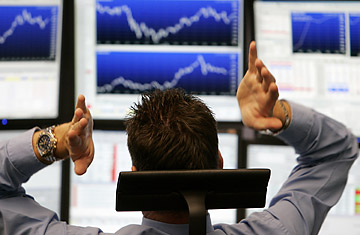
A broker raises his hands in despair at the Frankfurt stock exchange.
Could it be that global equity markets are just too irrational to merit the obsessed attention they're enjoying these days? That's the question some observers were asking Friday as indices in Asia and Europe posted gains only to decay again as the day progressed. It was a fittingly wacky end to a week that has seen bourses see-saw with unprecedented volatility. The VIX, Wall Street's leading measure of market volatility and investor fears, briefly scaled 80 points for the first time in its 18-year history Thursday, as stocks slid over recession worries."
"We really should stop looking at what markets do on a daily or weekly basis, because they've become purely speculative. Economic reason has been tied up and shut in the cellar," says economist Marc Touati, director general of research and strategy group Global Equities in Paris. Touati adds that recent developments — including American and European bail out plans for banking and financial systems valued together at over $4 trillion and the drop in oil prices and value of the euro — have given markets lots of reason to be bullish big time. "But they're are acting like spoiled kids throwing a tantrum: They've gotten gifts and excessive daily attention, but they just rant harder. Let's leave them a bit to work through it, calm down, and get back to normal."
That's easier said than done when the stock market's evolution is so central to a global economy facing a slow-down — or possible recession. And as this week wound down, observers of both markets and wider economies seemed uncertain whether to applaud or cry. Following dismal sessions Wednesday and Thursday, activity on Asian indices Friday was mixed, with Toyko's Nikkei up 2.2% aside more modest gains in Singapore and China. Hong Kong's Hang Seng remained flat, however, while South Korea and Australia slightly slumped. Inspired by that trend — as well as Wall Street's rebound from early losses Thursday to finish 4.7% up — European markets began Friday higher with London's FTSE 100, Frankfurt's DAX, and Paris' CAC 40 all by more than 4% — before receding by midday to hover just above opening levels.
So why the new reversal, and what does it bode for the coming days and months? Anyone claiming they know is blowing smoke. Though the brutal rout of global markets last week arose from fears the world's banking and financial markets risked total collapse in the face of the toxic credit crisis, government rescue plans detailed this week in both the U.S. and Europe mostly allayed those concerns, sparking surges on Monday and Tuesday. Market plunges since then came in the wake of negative news indicating serious slowing of American economic activity.
But the late week rally is harder to explain. The mini-boost has been accredited to better than expected quarterly results from tech companies like IBM and Google. Yet that good news Thursday coincided with figures showing that American industrial production in September dropped by 2.8% — the steepest fall since December, 1974. That came on the heels of statistics showing all-important consumer spending in the U.S. had tightened more than forecast. Meanwhile, despite government rescue plans and central bank rate cuts, there is little sign so far that frozen credit flows are thawing fast enough to get badly needed funds moving to businesses and households quickly.
Given that contrasting picture and yoyo-ing it produced this week, it might be wise to prepare for markets altering their view of the economic glass as half full or empty almost daily. When investors eventually return to reasoned trading, some observers think, the wider picture won't be as dark as many people expect. Touati notes, for example, the rescue plans, rate cuts, drop in oil prices, and fall of the euro are all positive developments for businesses. The downward pressure on stock prices across the board, meanwhile, suggests speculative markets are already factoring in anticipated declines in company results as the economy slow down. In other words, Touati says, a lot of the pain now being felt prepares the gain of an eventual rebound.
"Markets always lead us out of recession by anticipating recovery in the same way their fears of economic slowing accelerate the arrival of that very crunch," Touati says. "Right now, a lot of the medicine for a remedy for long-term recovery is already out there, but markets are in such a micro-short-term speculative mode they aren't taking it. That's what has driven share prices of many fundamentally sound companies so low that investors willing to take a risk now will make a killing in the longer term."
(Click here for a primer to the Volatility Index.)
(Click here to see how the financial crisis has affected London.)
